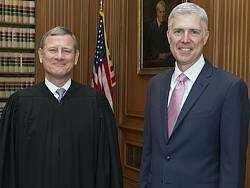Huge Win for Everyone With a Cellphone (and for the Fourth Amendment) at the Supreme Court

So I am typing this on my cellphone if i post this on steemit and steemit does not protect privacy which is impossible if I post it then it is out there the government would not need a warrant to look up my profile and see what I posted, but if I did not post it and I saved it to my notes on my cellphone now it is still private.
What governments would like the law to be regarding cellphones is that once you buy a phone and have a service provider you are now allowing your info to be public, but even this is still false unless the service provider clearly states that if you use their service all your information is up for grabs by the government then yes they could without a warrant get your info.
To my knowledge the terms and conditions do not say that your info is up for grabs if it did I don't think this Court decision would have happened nor would anyone really want to use that service.
Reason.com:
In a blockbuster 5-4 decision issued today, the U.S. Supreme Court ruled that warrantless government tracking of cellphone users via their cellphone location records violates the Fourth Amendment. "A person does not surrender all Fourth Amendment
protection by venturing into the public sphere," declared the majority opinion of Chief Justice John Roberts. "We decline to grant the state unrestricted access to a wireless carrier's database of physical location information."
I don't understand this so much because it does not drive the point that needs to be driven, the point is that the third party is supposed to keep your information private that's the whole point! It would be like me buying a car and the car salesmen says the brakes work, if the brakes didn't work then he is in the wrong.
This could be the reason that government likes to make it hard to startup cell phone companies because it would be harder to control and if there are tons of different cell providers then there are tons of different terms of use, exempt there is probably a universal government law that says what terms must be.
Reason.com:
The case is Carpenter v. United States. It arose after the after FBI obtained, without a search warrant, the cellphone records of a suspected armed robber named Timothy Carpenter. With those records, law enforcement officials identified the cell towers that handled his calls and then proceeded to trace back his whereabouts during the time periods in which his alleged crimes were committed. That information was used against Carpenter in court.
If Timothy was most likely the robber then it should have been no problem getting a search warrant to check his cell records, this is obviously a case of government employees doing whatever they want which can not happen.
Timothy was using his property to make phone calls therefore to search his property you must have a warrant according to the 4th.
Now by using a service provider did he surrender his right to privacy this is what the whole case is about, but what were the terms of the cell provider? Did the cell provider have terms that said any info you provide to use can be used against you by government without a warrant? If they did then obviously you had no expectation of privacy, usually these third parties say they will keep your info private.
Reason.com:
"I would look to a more traditional Fourth Amendment approach," Gorsuch wrote. "The Fourth Amendment protects 'the right of the people to be secure in their persons, houses, papers and effects, against unreasonable searches and seizures.' True to those words and their original understanding, the traditional approach asked if a house, paper or effect was yours under law. No more was needed to trigger the Fourth Amendment." Furthermore, Gorsuch wrote, "it seems to me entirely possible a person's cell-site data could qualify as his papers or effects under existing law."
Again yes my cell records are private, but if I give them to a third party that tells me my info is up for grabs then I am not protected by the 4th as I agreed to allow my info to be up for grabs, but again most of the time third parties say your info will be kept private and if that is the case with Timothy then the 4th amendment is supposed to protect him and the cell providers from searches and seizures.
Why is the government trying so hard to violate our rights? Can they not just leave us alone and let us live our lives? Now yes Timothy was and is probably a criminal, but that does not mean his rights should be violated to catch him. If he is quilty then it should be able to be proven the moral way.
Let's just hope that we can keep winning this fight thanks for reading guys and gals please upvote, follow, and leave your thoughts about Carpenter v. United States in the comment section!
Please Upvote➜https://steemit.com/christianity/@bible.com/verse-of-the-day-revelation-21-8-niv
Curated for #informationwar (by @wakeupnd)
Our purpose is to encourage posts discussing Information War, Propaganda, Disinformation and other false narratives. We currently have over 7,500 Steem Power and 20+ people following the curation trail to support our mission.
Join our discord and chat with 150+ fellow Informationwar Activists.
Connect with fellow Informationwar writers in our Roll Call! InformationWar - Contributing Writers/Supporters: Roll Call Pt 8
Ways you can help the @informationwar